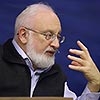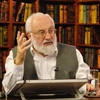 Comment: Five married couples who have lived together for over 50 years shared their secrets for a happy relationship. Here is what each couple considers to be most important. Tell us what you think, please.
Comment: Five married couples who have lived together for over 50 years shared their secrets for a happy relationship. Here is what each couple considers to be most important. Tell us what you think, please.
One 81-year-old couple, married for 57 years believe that the most important thing in a long and happy marriage is sharing responsibilities.
My Response: Of course.
Question: And what does sharing responsibilities entail? I am the breadwinner and my wife is a housewife taking care of the children?
Answer: That would be best.
Comment: Second is to know each other’s strengths and weaknesses.
My Response: Yes.
Question: Do you know your wife’s strengths and weaknesses?
Answer: I know them very well and I do not touch them. I am afraid to! In fact.
Question: Is this how it should be?
Answer: Yes.
Comment: Third is the ability to accept both sides.
My Response: Yes. You live with a person who is a whole system. It is a whole world through which you must see everything else.
Question: If this is how we live, tiptoeing around each other, then is it possible to be together for 60 or 70 years?
Answer: As long as you want.
Question: And you call this a happy marriage?
Answer: Only if we were brought up this way! Unfortunately, by the time we realize this, our life has gone by.
Question: Another couple aged 90 and 91-years-old who have been married for 66 years say it is essential to discuss their joint future and to have common interests. What do you think about discussing the future together? Is it important?
Answer: It is important because it is a joint future.
Question: Is that the key that it is not his or her future, but it is always us in it together?
Answer: Yes. We are going to have our children or grandchildren come to visit. Or we would go out, take a walk around the block, and so on.
Comment: As you said recently, when people get married, they say: “We are forever united together.”
My Response: They have to talk about it often.
Question: Is that what talking about a joint future is?
Answer: Yes. Because no matter what people do, they can live in different parts of the world, but they must share an understanding that they are united forever. Forever! Divorce is unacceptable when children are involved.
Question: And yet another couple that has been married for 61 years say that there should be a similar sense of humor. What do you think about that?
Answer: They must understand each other.
Question: Is this called understanding?
Answer: Yes. Because a sense of humor is very deep in a person. It distinguishes a person from an animal. Thus, if they have the same take on humor, it brings them much closer.
Question: A 99-year-old husband and 98-year-old wife married for 74 years say they love each other just like that and consider our union truly harmonious.
How do you feel about such views?
Answer: They have no deeper definition than “just like that.” This is a pretty high level. It is, indeed. When there is a real connection and feelings, you cannot describe it with anything.
Comment: And another couple married for 60 years say tolerance, loyalty to their vows, and being able to accept the other’s point of view are important.
Answer: This indicates they have not yet reached a real family if they believe it is necessary to be tolerant or faithful.
They still have these definitions before them and they must fulfill them. While a true connection requires none of this. You are already so glued to the other half that you cannot even tell where one ends or the other begins.
[304363]
From KabTV’s “News with Dr. Michael Laitman” 2/17/22
Related Material:
Why Living Together Before Marriage Is Bad For Your Relationship
Family And Marriage, Part 3
Married, But Free As A Bird!
Filed under: Man and Woman, Marriage, News | Add Comment / Ask Question →
 Michael Laitman, On Quora: “Why do we compare ourselves with anyone?“
Michael Laitman, On Quora: “Why do we compare ourselves with anyone?“













